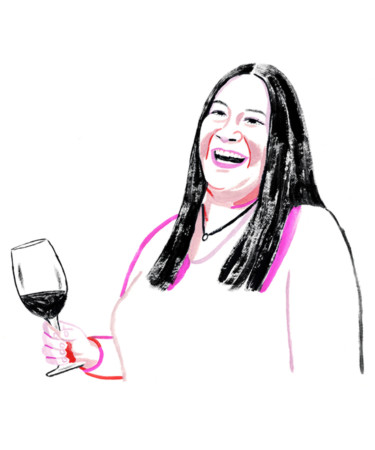
This article is a part of our inaugural Next Wave Awards. For the full list of 2021 winners, check out the whole series here.
Despite the progress of recent years, the global wine scene remains largely white and male. But there’s a new emerging group of winemakers whose skills and ingenuity are proving that the future of wine is anything but homogenous.
Hailing from the coastal Santa Ynez Valley in California’s Santa Barbara County, Tara Gomez makes wine with culture and place in mind. Her winery, Camins 2 Dreams, focuses on natural winemaking using grapes sourced from the Sta. Rita Hills AVA.
Gomez began her wine journey long before founding Camins 2 Dreams in 2017, receiving her enology degree from Cal State University Fresno and working for nearly a decade at Paso Robles’ J. Lohr Winery. In 2010, she started Kitá Wines, a winery on Camp 4 Vineyard — land owned by the Chumash tribe of which she is a part.
As the first recognized Native American winemaker in history, Gomez has embraced her cultural background in creating her wines, which are fruit-forward, approachable, and refreshing. If there’s one word to describe how her upbringing has influenced her winemaking style, Gomez says, it’s “balance.” Embracing and adapting to the environment is an important tenet of Gomez’s Chumash tribe, and she feels it’s both natural and vital to bring this mindset to her grape-growing practices.
“In winemaking, it’s a balance of the fruit, acid, alcohol, and structure,” she says. “I truly feel that having respect for Mother Earth by not only taking what we need, but by giving back in sustainable ways, will only strengthen our connection to the land.”
Camins 2 Dreams’ terroir-driven wines therefore celebrate the land they were grown on. While Pinot Noir and Chardonnay are the varieties most often associated with the area, Gomez chooses to focus on more non-traditional varieties such as Grüner Veltliner, Gamay, Carignan, Syrah, and Albariño, which prove that Santa Barbara’s soils are capable of growing so much more than the region’s top sellers
Along with her wife and business partner, Mireia Taribò, Gomez is also investing in the drinks community with social initiatives. This year, Gomez became a mentor with the James Beard Foundation’s inaugural Legacy Mentorship Program, a network that trains up-and-coming talent in the food and beverage industries. “Because of the lack of mentors I had entering into this industry, I now strive to mentor others in the wine industry so they don’t have to go through what I endured,” Gomez says.
With a goal of helping emerging talent succeed, Gomez has also found community herself through mentorship programs like the Hue Society, Bâtonnage, Speed Rack, and the advisory council for Woman-Owned Wineries, all of which are dedicated to uplifting and supporting underrepresented communities in the drinks industry.
Championing both underrepresented communities and unsung varieties in wine is clearly a goal of Gomez’s — and she shows no signs of slowing down. “I truly have a passion for the varieties that may not receive a lot of individual representation,” she says. “Finding the uniqueness in a cluster of grapes brings me an abundance of excitement.”
